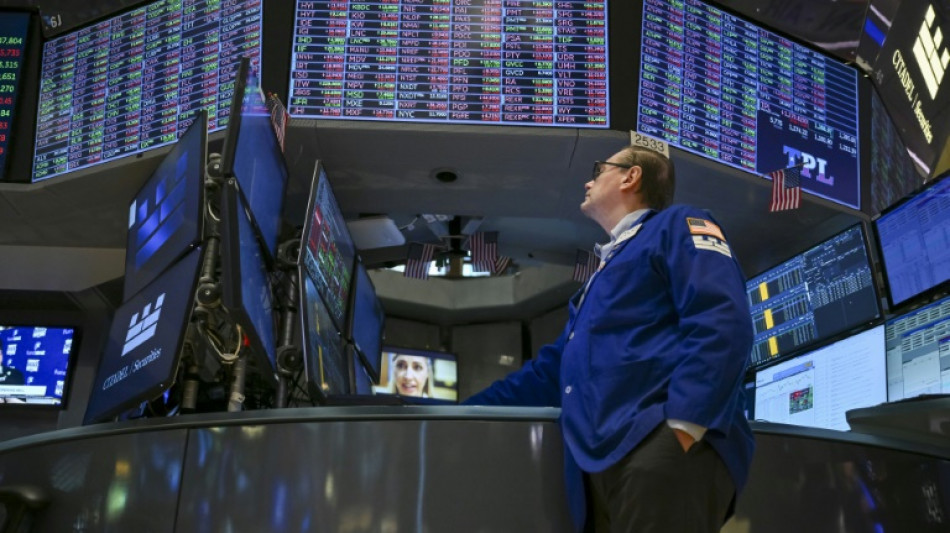
-
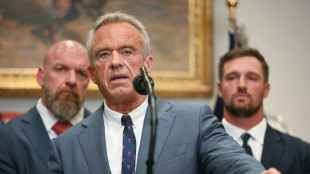 US health chief based vaccine cuts on misinformation, researchers say
US health chief based vaccine cuts on misinformation, researchers say
-
US astronaut Jim Lovell, commander of imperiled Apollo 13, dead at 97

-
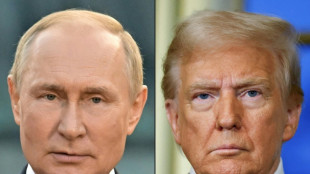 Trump says will meet with Putin 'very shortly'
Trump says will meet with Putin 'very shortly'
-
Barcelona reinstate Ter Stegen as captain

-
 Fleetwood leads St. Jude in search of first US PGA Tour title
Fleetwood leads St. Jude in search of first US PGA Tour title
-
Gold futures hit record on US tariff shock; mixed day for stocks

-
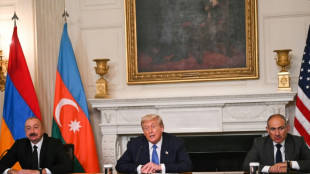 Trump says Armenia, Azerbaijan committed to end fighting 'forever'
Trump says Armenia, Azerbaijan committed to end fighting 'forever'
-
England's injured Woakes still has Ashes hopes

-
 US astronaut Jim Lovell, Apollo 13 commander, dead at 97
US astronaut Jim Lovell, Apollo 13 commander, dead at 97
-
Swiss gold refining sector stung by US tariffs
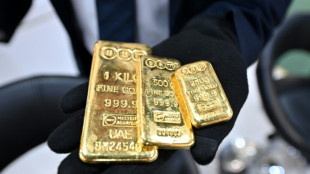
-
 New Instagram location sharing feature sparks privacy fears
New Instagram location sharing feature sparks privacy fears
-
Spain's Badosa withdraws from US Open

-
 Mexico seeks compensation from Adidas in cultural appropriation row
Mexico seeks compensation from Adidas in cultural appropriation row
-
NBA Celtics sign Mazzulla to coaching contract extension

-
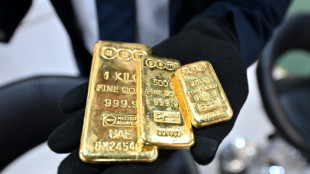 Swiss gold refining sector hits US tariff mine
Swiss gold refining sector hits US tariff mine
-
Ter Stegen responds after Barcelona strips him of captaincy

-
 Chelsea's Broja joins Burnley on five-year deal
Chelsea's Broja joins Burnley on five-year deal
-
Three centurions as 'ruthless' New Zealand pile on runs against Zimbabwe

-
 Three die in Greece as gales stoke fires, disrupt ferries
Three die in Greece as gales stoke fires, disrupt ferries
-
ICC unseals Libya war crimes warrant for militia officer

-
 Montreal protagonists Mboko, Osaka out of Cincinnati Open
Montreal protagonists Mboko, Osaka out of Cincinnati Open
-
Trump says court halt of tariffs would cause 'Great Depression'
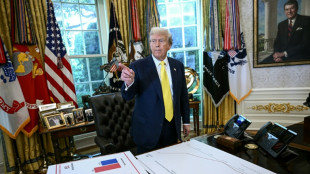
-
 Glasner says demotion to Conference League would punish 'innocent' Palace
Glasner says demotion to Conference League would punish 'innocent' Palace
-
New Zealand build big total in 2nd Test against Zimbabwe

-
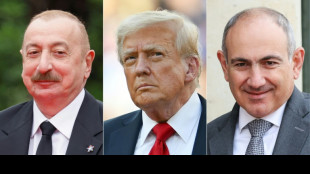 Trump hosts foes Armenia, Azerbaijan in his latest peace initiative
Trump hosts foes Armenia, Azerbaijan in his latest peace initiative
-
Nigerian scientists await return of Egusi seeds sent to space

-
 Pioneer spirit drives Swiss solar-powered plane altitude attempt
Pioneer spirit drives Swiss solar-powered plane altitude attempt
-
Thyssenkrupp to spin off marine division amid defence boom

-
 Vance and Lammy talk Gaza, fish as US VP starts UK holiday
Vance and Lammy talk Gaza, fish as US VP starts UK holiday
-
Israel plans to 'take control' of Gaza City, sparking wave of criticism

-
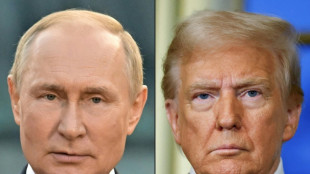 Putin taps key allies ahead of Trump summit, sanctions deadline
Putin taps key allies ahead of Trump summit, sanctions deadline
-
Two tourists die, fires erupt in Greece amid gale-force winds

-
 Lens sign France international Thauvin from Udinese
Lens sign France international Thauvin from Udinese
-
Gold futures hit record on US tariff shock, stocks wobble

-
 Man Utd training ground upgrade will foster 'winning culture': Ratcliffe
Man Utd training ground upgrade will foster 'winning culture': Ratcliffe
-
Two tourists die at sea in Greece amid gale-force winds

-
 'Optimistic': Champagne growers hope for US tariff shift
'Optimistic': Champagne growers hope for US tariff shift
-
French firefighters optimistic after controlling vast wildfire

-
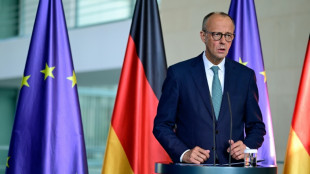 Germany suspends arms exports to Israel for use in Gaza
Germany suspends arms exports to Israel for use in Gaza
-
Stocks waver, gold futures hit record on US tariff updates

-
 Guessand says he jumped at chance to join Aston Villa after sealing move
Guessand says he jumped at chance to join Aston Villa after sealing move
-
Israel to 'take control' of Gaza City, sparking wave of criticism

-
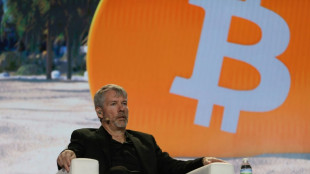 Accumulating bitcoin a risky digital rush by companies?
Accumulating bitcoin a risky digital rush by companies?
-
Liverpool's Slot hints at fresh Isak bid despite 'attacking power'

-
 PSG to sign Lille goalkeeper Lucas Chevalier: source
PSG to sign Lille goalkeeper Lucas Chevalier: source
-
Oil industry presence surges at UN plastic talks: NGOs
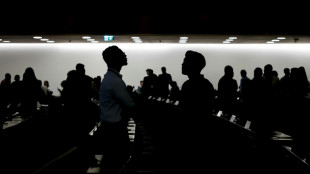
-
 Kipyegon says a woman will run a sub-four minute mile
Kipyegon says a woman will run a sub-four minute mile
-
Tokyo soars on trade deal relief as most Asian markets limp into weekend
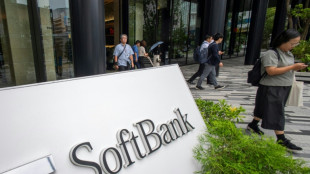
-
 Israel to 'take control' of Gaza City after approving new war plan
Israel to 'take control' of Gaza City after approving new war plan
-
Australian A-League side Western United stripped of licence

| RBGPF | -5.79% | 71.84 | $ | |
| SCU | 0% | 12.72 | $ | |
| BCE | 2.34% | 24.35 | $ | |
| CMSD | 0.25% | 23.58 | $ | |
| NGG | -1.51% | 71.01 | $ | |
| SCS | -0.76% | 15.88 | $ | |
| BCC | -1.34% | 82.09 | $ | |
| CMSC | 0.39% | 23.05 | $ | |
| RYCEF | -0.7% | 14.35 | $ | |
| RIO | 1.76% | 61.86 | $ | |
| VOD | 0.88% | 11.36 | $ | |
| RELX | -2.2% | 48 | $ | |
| JRI | 0.19% | 13.435 | $ | |
| BTI | 0.96% | 57.24 | $ | |
| GSK | 0.58% | 37.8 | $ | |
| BP | -0.15% | 34.14 | $ | |
| AZN | -0.69% | 73.55 | $ |

Financial markets may be the last guardrail on Trump
Since returning to the White House, Donald Trump has ushered in sweeping changes to international geopolitics and US government administration with little regard for norms that have constrained predecessors.
But there has been one source of restraint on a president determined to push the limits of US governance: financial markets.
The stock market's response to Trump's "Liberation Day" tariff announcement was "probably the most influential force to date" in tempering Trump's policies, said Terrence Guay, professor of international business at Pennsylvania State University.
In just two days, Wall Street equities shredded some $6 trillion in value as the S&P 500 suffered its worst session since the darkest days of Covid-19 in 2020.
"The market does tend to be ... kind of like a seismograph. It reacts to the slightest little tremor," said Steven Kyle, professor of applied economics at Cornell University.
A week after Trump's announcement of reciprocal tariffs threw markets into turmoil, the Republican suddenly scaled back his plan's most draconian elements for every country except China. The pivot sent stocks skyrocketing.
Last week, market watchers perceived another significant Trump retreat after another round of scary market action. The gyrations came after the president combined an ever-worsening tit-for-tat trade war with China with threats to oust Federal Reserve Chair Jerome Powell.
The White House quickly shifted its tone on China and Trump reassured the public that he won't fire Powell.
"Markets 'punished' his policies and he must have realized," along with his advisors, "that trade wars are not that easy to win," said Petros Mavroidis, a professor at Columbia Law School and a former member of the World Trade Organization.
"I am sure he doesn't want to be known as the president who led to a stock market crash," Guay added.
- Bond market angst -
But if "Wall Street sent the loudest signal, it wasn't the only signal," said University of Richmond finance professor Art Durnev.
Even more than the stock market, "the bond market is a stronger force and this is the primary driver" of Trump's shift, Durnev said.
Like gold or the Swiss franc, US Treasury bonds have traditionally been seen as a refuge for investors during times of duress in financial markets, or in the real economy.
But demand for US Treasury bonds -- a bedrock during the 2008 financial crisis and other perilous moments -- has been shaken in recent weeks as Trump's aggressive policies have pushed yields higher in a sign of flagging demand for American issues.
Trump himself acknowledged the import of the bond market gyrations, saying investors were getting "a little bit yippy." That word means nervous.
The bond market "also had a big impact," Guay said. "Many investors have pulled their money out of the US."
Besides Trump's ambitious attempts to overhaul international trade, analysts have tied bond market volatility to worries that planned tax cuts could worsen the US deficit.
Then there is Powell, whom Trump also criticized in his first presidential term. The most recent round of Treasury market panic followed Trump's social media post on April 21 branding Powell a "major loser" for not cutting interest rates.
But by the following day, Trump had pulled back, saying he had "no intention of firing" Powell.
The combination of these factors means investors are beginning to realize that "the US may not be, under this administration, the stable environment we've seen for decades," Guay said.
W.AbuLaban--SF-PST
